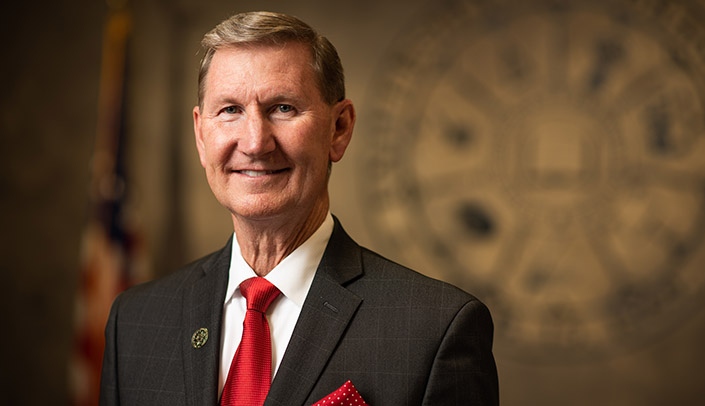Workforce development — a high priority across the University of Nebraska system in the pre-COVID world — has taken on new urgency in the face of a pandemic that has impacted economic growth locally and across the country, President Ted Carter told a legislative committee Monday.
Nebraska leaders will need to continue to take decisive action to sustain economic growth through the pandemic, Carter said during testimony to the Legislature’s Appropriations Committee. Carter was among the higher education representatives to testify on LR 389, an interim study sponsored by Appropriations Chairman John Stinner to examine the impact of COVID-19 on workforce development and efforts by Nebraska postsecondary institutions to address existing shortages.
“Nebraska has been fortunate to avoid some of the most devastating economic consequences of the pandemic. But no one has been immune,” Carter said, thanking Stinner, Appropriations Committee Vice Chairwoman Kate Bolz and their colleagues for their attention to critical issues facing the state.
“I’m pleased to tell you the University of Nebraska is laser-focused on workforce development and economic growth. COVID-19 has only accelerated our thinking. The success of the state and its public university are intertwined: When we grow, so grows the state.”
Carter pointed to a number of specific steps taken recently by the university to expand access and flexibility for students during a challenging period. Greater access, he said, will help drive enrollment growth, which in turn will position the university to make an even greater impact on Nebraska’s workforce and competitiveness.
Nebraska currently faces an annual shortage of 34,000 openings in high-skill, high-demand, high-wage jobs like engineering, nursing, IT and accounting. The university’s campuses produce an estimated 11,000 graduates each year, with goals to grow that figure to help close the gap, Carter said.
NU’s recent actions include:
- The launch of the Nebraska Promise, a financial aid program guaranteeing full tuition coverage for Nebraska students with family incomes of $60,000 or less.
- Implementation of a two-year, across-the-board tuition freeze for the 2021-22 and 2022-23 academic years.
- Reduction of tuition rates for most undergraduate, resident online courses.
- Active exploration of other pricing strategies to expand access and attract talent to Nebraska. The University of Nebraska at Kearney’s recently launched “New Nebraskan” scholarship, for example, will provide a discount to out-of-state, on-campus undergraduates to bring them to the resident tuition rate.
- And, as announced Monday, an application fee waiver for Nebraska undergraduates applying to the University of Nebraska-Lincoln, University of Nebraska at Omaha, University of Nebraska at Kearney and Nebraska College of Technical Agriculture. From Oct. 1 to Oct. 18, Nebraskans can have the $45 application fee waived.
Carter also highlighted the Nebraska Career Scholarships, a new program approved by the Legislature and Governor Pete Ricketts this year that will invest a total of $16 million over the next four years in scholarships for students in high-demand fields. Half of the total, $8 million, will be allocated to the University of Nebraska. Carter praised policymakers for their forward-thinking investment in student access and workforce development.
The university’s actions to support students and families throughout the pandemic played a role in a 1 percent growth in enrollment across the system this year, Carter said. Notably, all campuses experienced growth among resident undergraduates, and the university is seeing key gains among minority, first-generation and other underrepresented students.
